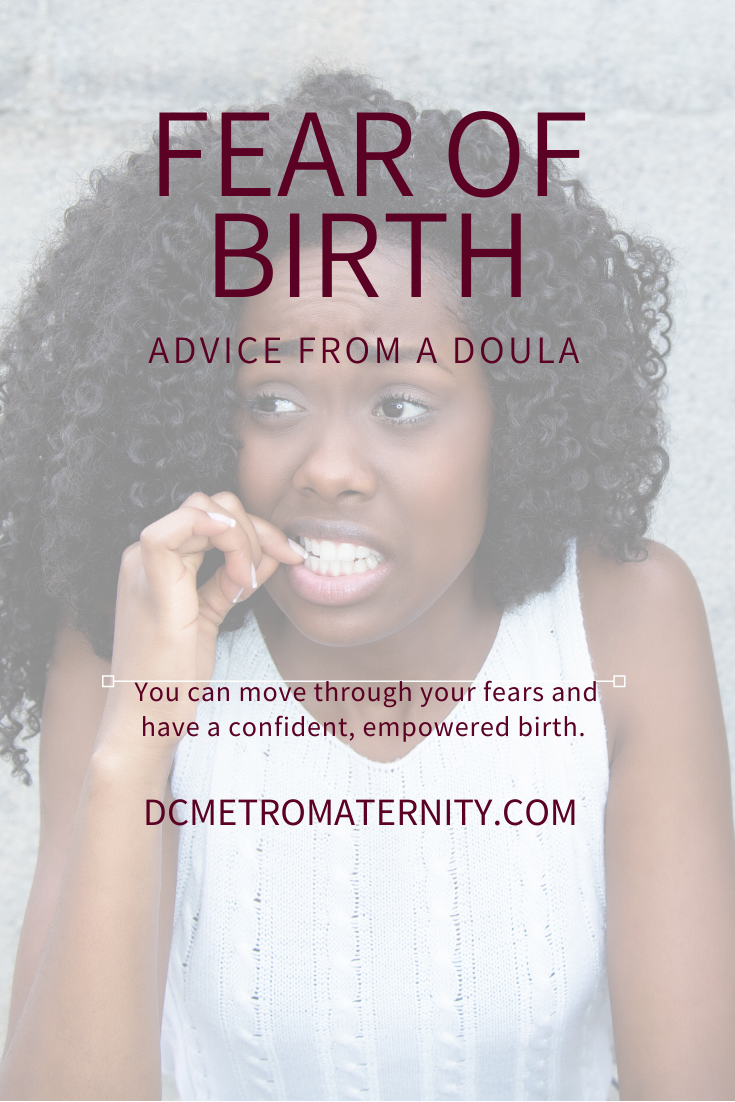I think that fear of childbirth is a huge motivator in hiring a doula.
It seems like I’m not supposed to say that to you if you’re pregnant.
I suspect that a lot of doulas want birth to be seen as a glorious rite of passage, that we’re all excited about. I’m supposed to tell you that everything will be amazing and there’s nothing to worry about when you have your baby.
But as someone who talks to expectant mothers a few times a week, I have to tell you that fear of childbirth is just as normal and natural as having a baby itself.
The thing about birth though, is that it’s a fear that you do indeed have to face. At least, if you’re pregnant and talking to a doula.
“The only way out is through”, as they say. (They is me. I say that.)
But how? Well, today we’re going to tackle some of the most common fears I hear from pregnant women, and find some coping strategies.
Fear of Labor Pains
It’s very hard to imagine a contraction. As doulas and childbirth educators, we can tell you where most people feel them- in the lower back, the pelvic floor, or around the belly. We can let you know that they often become rhythmic, and gradually get longer stronger and closer together. As your support team during labor and delivery, we can tell you that big strong contractions are good and helpful. They get babies out.
But that’s easy for us to say- we’re not the ones preparing for labor.
Perhaps in most of your life, you have a low pain tolerance. And now you’re about to approach an unfamiliar set of sensations for an unknown amount of time. So labor pains can be scary.
What do I do if I’m afraid of contractions?
First step: know that the sensations associated with labor (unlike other pain) are purposeful. Instead of a sign that something is wrong, this pain is a sign that things are going according to plan. Your body is birthing your baby.
Once you understand that, you get to decide how to manage it. You can:
- Work throughthrough it with labor positions, comforting touch and other tools to bring physical relief.
- Use visualization and use affirmations to keep the fear away.
- Get pain relief from an epidural.
All of these are good options, and you can learn about them in detail at a childbirth education class or with a doula. You’ll get through this and we can be by your side.
Fear of Pushing (and Tearing)
Maybe what you’re worried about is getting the baby out. Thinking about pushing, and how exactly your body will open and stretch probably just made some of you reading this tense up.
We’re not the sort of doulas that tell you that you should expect a quick orgasmic birth (though Mazel Tov if that’s your story). Pushing can take a while, especially the first time. You might poop (though we’ll never speak of it). It might hurt.
But just like the fear of contractions, if you’re having a vaginal birth, fear of pushing is one that we have to confront and move past. And you can.
What do I do if I’m afraid of pushing or tearing?
Just because you’re birthing in a hospital, doesn’t mean that you will be birthing flat on your back, screaming. (In fact, we almost never see that except on TV.)
- Learn about different pushing positions and what’s available at your hospital.
- Consider warm compresses or perineal massage.
- Find out if your hospital has a squat bar or a mirror if that might be helpful for you.
- Know that while small first degree tears are common, major fourth degree tears are not, thankfully. And neither are episotomies these days. Talk to your provider about how they handle tearing and what you can do.
Fear of sickness
Dr. Google and WebMD can convince you that a headache is a brain tumor. Pregnancy, with its unfamiliar symptoms and sense of mystery, can be one of the worst times for this.
At no other time in your life are nausea and vomiting considered par for the course. As pregnancy goes on there are too many changes to name and your body can feel unfamiliar- swelling, skin changes, shortness of breath, just to name a few- even when everything is going smoothly for you and your baby.
Then there are the complications: gestational diabetes, pre-eclampsia, placenta previa, and on and on. Not to mention wondering what’s happening with your baby, whom you can’t even see.
We’re never surprised when our clients feel anxious, or worry that they’re sick during pregnancy. Phew!
What do I do if I’m worried that I’m having a pregnancy complication?
As doulas we’re happy to talk you through these fears. You want to be sure though, that you’re doing three things:
- Trust your instincts. You know your body and you know when something is off.
- Talk to a provider that you trust. This is what your doctor or midwife is there for- keeping you and your baby safe.
- Step away from google. (Seriously!)
Fear of Hospitals and Doctors
The thing about fear of sickness and doctors, is that it can lead to a self fulfilling prophecy. So let’s talk about White Coat Syndrome:
Sometimes patients are so nervous about visiting the doctor that their blood pressure spikes when they go in for an appointment, even if normally they have healthy readings. Related to this, being fearful of your prenatal appointments can make them harder, and worries about illness can lead to stress, which isn’t great for your health.
Outside of birth, most of us don’t visit the doctor every week. And our associations with hospitals tend to be illness.
What do I do if prenatal care makes me nervous?
Find the source of your concern. If you’re:
- Worried about a potential induction, particular drugs (Pitocin is one that’s mentioned often), or being rushed into a cesarean, then talk to your doctor about when and why that would come up.
- Having negative interactions with your healthcare provider see if you can approach them as a team and problem solve. Or consider finding another provider if needed.
- Anxious because you haven’t been before, take a hospital tour to familiarize yourself with your birthplace.
We encourage you to make active decisions when it comes to your healthcare and work with people you trust. Choose your birth team and birthplace on purpose.
If you need help figuring out these conversations, that’s definitely a thing a doula can help with.
Death in childbirth
This one is tough. Many of our clients are black women and women of color. And the news has been grim for us. Real grim.
But I am determined to push back against the idea that our births are dangerous and all we must do is survive. You deserve to enjoy your pregnancy, and be excited about growing your family.
What do I do if I’m afraid of dying in childbirth?
Sometimes, the thing to do about this fear (especially once you’ve done everything you can to be healthy and safe), is to stop reading the news. Statistics don’t tell you what will happen in your birth.
- Take care of your health and know any risk factors you have for complications.
- Assemble your birth team.
- Speak up for yourself and get help with this if you need it.
Then try to enjoy yourself. Your birth can be about celebrating life, not just avoiding death.
Trauma in Pregnancy and Birth
Pregnancy is a time that can make us feel vulnerable. Many of our clients have spent adulthood achieving pretty kickass things, and as women (and women of color especially), y’all have overcome a lot. And often, you’re excited about growing your family. You want and love your baby.
But sometimes there are things that resurface during pregnancy. It might be memories of a previous illness, sexual assault or loss of a baby. It could be something else.
Whatever the trauma is, know that you’re not alone, and nothing that’s happened to you makes you a bad mother.
What do I do if pregnancy and birth bring up trauma?
- Consider therapy. Pregnancy gives you and a professional several months to make a plan for your birth that feels safe and healthy.
- Affirm for yourself daily that you are safe, you’re keeping your baby safe, and you’re going to be a good mom.
- Ask your birth team to make sure that procedures are explained to you. It’s your body and you can be informed about what’s happening.

Overcoming Fear of Labor & Birth
The thing about birth is that fear only makes it harder. And usually, if you’re reading a doula website, you want a different experience.
So the very first thing that we do is bring all of those deep dark worries into the light. Reading through this list might have been hard. But often, fear of the unknown is harder.
If you made it this far you’re already on your way to confronting whatever it is that stands between you and birth where you feel calm and confident.
I encourage you to do more of that. Don’t keep the fear bottled up- instead, let it out. Here are some things that can help:
- If you journal, write down your fears. Most things are better if they don’t stay in our heads.
- If you’re the kind of person who likes a ritual, burn that list of fears afterward and let that shit go. You’ve confronted it, and now we’re moving on from any fear of birth.
- Write down what you want the experience to feel like. Dream big and then focus on what you’re hoping for.
- Take a childbirth education class, to reduce the fear of the unknown. Ask questions of someone who’s an expert, and not only Dr. Google.
- Write a birth plan. This isn’t about making everything happen, step by step. Instead, birth planning is about learning your options, making decisions and asking for what you want. There’s power in that.
- Talk to your partner, trusted friend or doula about your concerns as they come up.
- Tell your friends and family that you want to hear positive birth stories. And remember that your birth will be your story, and not theirs.
- Treat your medical provider like a teammate. Assume that they want the best for you, and ask them questions about things you don’t understand.
- Get a therapist if you need one.
Above all, remember, this birth isn’t just happening to you, and you’re more powerful than your fears, even your fear of birth.
Control what you can, and find ways to manage what you can’t. You’ve got this, and if you need some extra support contact us!


